The IEEE has proudly unveiled the recipients of its distinguished 2025 medals, technical awards, and fellowships, shining a spotlight on four exceptional faculty members, one dedicated staff member, and five outstanding alumni from MIT.
Regina Barzilay, a trailblazer in artificial intelligence and health at MIT’s Department of Electrical Engineering and Computer Science (EECS), has been honored with the IEEE Frances E. Allen Medal. This accolade recognizes her groundbreaking work in developing innovative machine learning algorithms that advance human language technology and have significantly impacted the medical field. Barzilay’s work focuses on harnessing machine learning to model molecular properties for drug design, aiming to illuminate disease biochemistry and speed up the creation of new therapeutics. In clinical AI, her algorithms are pivotal for early cancer diagnostics. As the AI faculty lead at the MIT Abdul Latif Jameel Clinic for Machine Learning in Health and an affiliate of various prestigious labs, Barzilay’s accolades include membership in the National Academy of Engineering, the National Academy of Medicine, and the American Academy of Arts and Sciences. She is also the recipient of the MacArthur Fellowship and MIT’s Jamieson Award.
James J. Collins, the Termeer Professor of Medical Engineering and Science at MIT and a member of the Harvard-MIT Health Sciences and Technology faculty, received the 2025 IEEE Medal for Innovations in Healthcare Technology. Collins is renowned for his pioneering work in synthetic gene circuits and programmable cells, marking the birth of synthetic biology with significant implications for healthcare. As a founding faculty member of the Wyss Institute for Biologically Inspired Engineering and an institute member of the Broad Institute, his research employs engineering principles to devise novel diagnostics and therapeutics. Collins has co-founded several companies and garnered numerous awards, including the MacArthur “Genius” Award and recognition by the National Academies of Sciences, Engineering, and Medicine.
Roozbeh Jafari, a principal staff member at MIT Lincoln Laboratory’s Biotechnology and Human Systems Division, has earned IEEE Fellow status for his impactful contributions to digital health sensors and systems. Jafari is committed to fostering collaborative programs between Lincoln Laboratory, the MIT campus, and academic institutions across the U.S. His expertise encompasses wearable-computer design and AI for digital health, with recent efforts directed toward precision health through digital twins. He is a prolific author with over 200 papers and holds several prestigious awards, including the National Science Foundation’s Faculty Early Career Development Award.
William Oliver, the Henry Ellis Warren (1894) Professor of Electrical Engineering and Computer Science and professor of physics at MIT, has been named an IEEE Fellow for his significant contributions to superconductive quantum computing technology. As the director of the MIT Center for Quantum Engineering, Oliver’s research centers on superconducting qubits and small-scale quantum processors. He also plays a crucial role in educational outreach through online courses on quantum computing. His research output consists of over 130 articles and he holds more than 10 patents, further solidifying his reputation in the field.
Daniela Rus, director of the MIT Computer Science and Artificial Intelligence Laboratory, has been awarded the IEEE Edison Medal for her sustained leadership and pioneering contributions in modern robotics. Her research aims to develop the science of autonomy in robotics, envisioning robots that can seamlessly interact with humans to assist with various tasks. Rus has been recognized with numerous honors, including a MacArthur Fellowship and membership in multiple prestigious academies.
In addition to the faculty honors, five distinguished MIT alumni were acknowledged:
Steve Mann, PhD ’97, recognized with the Masaru Ibuka Consumer Technology Award for his groundbreaking contributions to wearable computing and high dynamic range imaging. A founder of the MIT Wearable Computing Project, Mann currently teaches at the University of Toronto and is an IEEE Fellow.
Thomas Louis Marzetta, ’72 PhD ’78, received the Eric E. Sumner Award for his pioneering work on Massive MIMO technology in wireless communications. As a distinguished professor at NYU’s Tandon School of Engineering, he has been crucial in advancing academic research in this area.
Michael Menzel, ’81, honored with the Simon Ramo Medal for his role in developing the James Webb Space Telescope, now operational to explore the universe’s earliest galaxies. Menzel works as a mission systems engineer at NASA.
Jose Manuel Fonseca Moura, ’73, SM ’73, ScD ’75, received the Haraden Pratt Award for his leadership and contributions to the IEEE in education and technical activities. Moura is a Philip L. and Marsha Dowd University Professor at Carnegie Mellon University and an influential figure in several academic and professional societies.
Marc Raibert, PhD ’77, earned the Robotics and Automation Award for his foundational efforts in dynamic legged locomotion. As the founder of Boston Dynamics, Raibert continues to innovate in the robotics industry.
Photo credit & article inspired by: Massachusetts Institute of Technology



